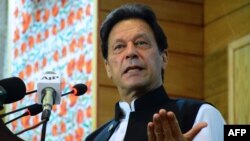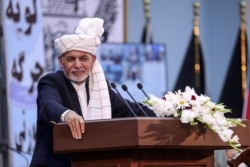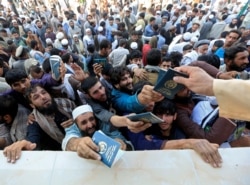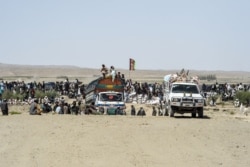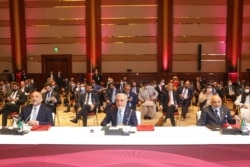Pakistani Prime Minister Imran Khan will travel Thursday to neighboring Afghanistan for meetings that officials say will focus on strengthening economic cooperation and matters related to U.S.-backed peace efforts aimed at ending the Afghan conflict.
Khan, who assumed power two years ago, is undertaking his first official visit to Kabul at the invitation of Afghan President Ashraf Ghani amid relatively improved relations that have long suffered from mutual mistrust and suspicions.
Officials say a flurry of high-level visits of top government officials and lawmakers in the run-up to Khan's maiden trip have helped ease tensions and improve economic coordination.
"The prime minister's visit builds on the sustained engagement between the two countries in recent months for enhancing bilateral cooperation in diverse fields," said Pakistani Foreign Ministry spokesman Zahid Hafeez Chaudhri on Wednesday.
Chaudhri said Khan and Ghani will hold a one-on-one meeting before leading their respective delegations in formal talks. The visit will help "foster a stronger and multi-faceted relationship between the two brotherly countries," the spokesman added.
Pakistan's links with the Afghan Taliban insurgent group have been the primary source of political tensions with Afghanistan. The two countries share a nearly 2,600-kilometer-long border, and Islamabad also accuses Kabul of allowing fugitive Pakistani militants to use Afghan border areas to plot cross-border subversive acts.
Khan's government insists it does not support any faction in the Afghan war and is working to promote a peaceful Afghanistan to ensure regional connectivity and economic prosperity.
Landlocked Afghanistan has for decades relied mostly on Pakistani overland routes and seaports for bilateral and international trade. Mutual tensions, however, have significantly undermined bilateral trade activities in recent years.
Last September, Islamabad unveiled a string of what officials described as "confidence- building measures" to facilitate Afghans visiting Pakistan for medical treatment, education and business dealings. The steps include long-term business, investment and student visas for Afghan visitors as opposed to traditional one-time entry visas for a limited number of days.
Officials say Pakistan also has operationalized all border terminals in recent weeks to facilitate bilateral and transit trade activities to help Kabul overcome increased economic troubles in the wake of the coronavirus pandemic.
Khan's government takes credit for arranging months-long historic negotiations between the Taliban and the United States that produced a peacebuilding deal this past February, initiating a "conditions-based" withdrawal of all American and NATO troops from Afghanistan by May 2021. The insurgents in return pledged to stop attacks on international forces and promised to sever links to terror groups, including the al-Qaida network.
The U.S.-Taliban pact also opened in September the first-ever direct peace talks between the insurgent group and representatives of the Afghan government to negotiate a permanent cease-fire. But the so-called intra-Afghan dialogue under way in Qatar has mostly stalled, with each side blaming the other for the delay.
President Donald Trump's administration has also acknowledged Islamabad's role in facilitating the Afghan peace process and setting the stage for extracting American troops from the longest U.S. war in the history.
Afghan presidential spokesman Sediq Sediqqi reiterated Wednesday the "presence of terrorists hideouts" in Pakistan is a matter of concern for the Afghan government, but he went on to acknowledge Islamabad’s policy on the issue has lately been changed.
Kabul has long alleged that Taliban leaders and fighters have used sanctuaries on Pakistani soil to sustain and expand insurgent actives on the other side of the border.
Pakistan hosts about 3 million Afghan refugees and economic migrants, who have fled 40 years of violence, religious persecution and poverty in their conflict-torn country. Islamabad says the refugee community serves as a hiding place for the Taliban and has been urging the international community to arrange for an early repatriation of Afghan refugees from Pakistan.
Last Saturday, the Pakistani government revealed at a news conference what it said was "irrefutable evidence" about Indian-sponsored terrorism in Pakistan from Afghanistan.
A military spokesman said Indian intelligence operatives were running 66 camps on Afghan soil to train fugitive Pakistani militants with the help of Afghan collaborators. Both Kabul and New Delhi rejected the allegations as "fabricated."




